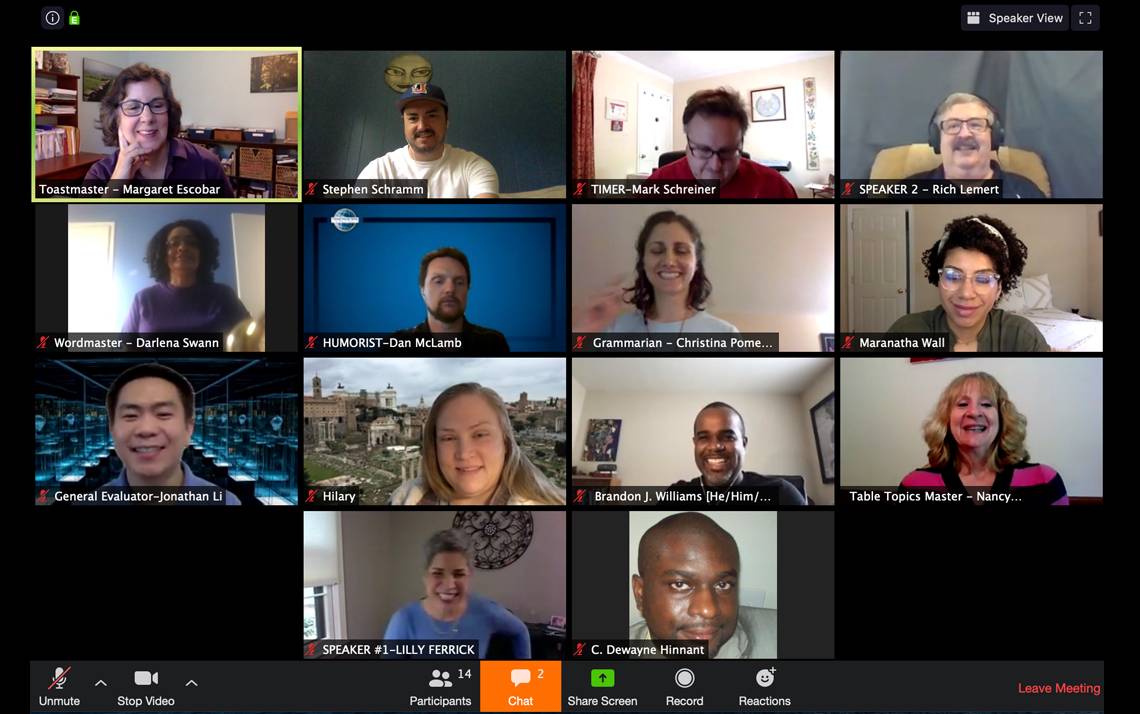Public Speaking Clubs Go Virtual
Challenged by COVID-19, Toastmasters members found ways to sharpen their virtual-meeting skills

Just like it has done twice every month for years, the Blue Devil Toastmasters Club met on a recent Friday.
With around a dozen members and guests taking part, the group cycled through usual meeting agenda, starting with a joke, then sharing stories about their experiences or thoughts on a question, and finishing with helpful feedback about their talks.
And, when club member Nancy Williams’ dog jumped onto her lap, the virtual meeting didn’t skip a beat.
The response to COVID-19 has required that most members of the Duke community stay away from campus. This has meant that the three Toastmasters Clubs that typically meet at Duke have adapted by holding sessions on the Zoom video conference platform.
“It’s been a transformational period for everyone,” said Mark Schreiner, vice president for education with the Blue Devil Toastmasters and web content strategist for the Pratt School of Engineering. “That’s especially true for Toastmasters, which has traditionally relied so much on face-to-face contact.”
With around 358,000 members in 141 countries, Toastmasters International’s clubs combine fun fellowship with personal and professional growth. The idea is that by sharpening your public speaking skills in a welcoming and supportive environment, members learn to communicate and lead more effectively elsewhere in their lives.
Toastmasters Clubs are shifting to virtual meetings at the same time nearly every other business is doing the same. By participating in a Toastmasters meeting, you can hone your speaking skills and get some experience with video conferencing as well. The clubs at Duke welcome guests at every meeting, and encourage them to visit few times to get a feel for the club. If they decide to join, there is a small fee that provides full access to skill-developing resources.
“This situation isn’t going to go away,” said Margaret Escobar, area director for Durham’s Toastmasters Clubs. “It’s not going to end next week or next month. There will still be a need for virtual communication in the future. This is a 21st century skill and people are realizing, ‘Hmm, I probably need this.’”
The Duke Toastmasters Club next meets at 7 a.m. Wednesday, May 20 while the Blue Devil Toastmasters Club next meets at noon on Friday, June 5. The PRATTically Speaking Toastmasters Club next meets at noon Wednesday.
While the temporary transition to video conferencing has been almost seamless, there have been some kinks to iron out. Schreiner said it took some time for his group to figure out how to signal to speakers that they are nearing the end of their allotted times. After some experimentation, Schreiner and his group embraced a system of the meeting’s Timer using a function on the Toastmaster’s smartphone app, and then holding up their phone to their computer’s webcam to show the green-yellow-red color changes as time ticks down.
There’s also the question of how to use body language while on a video conference.
“It’s very different than standing in front of the audience and being able to jump from one end of the stage to the other,” said Maggie Gatongi, vice president for education for the PRATTically Speaking Toastmasters Club and a lab administrator for Duke Biomedical Engineering. “It gets you thinking that, since you don’t have that tool, how can I use my voice, how can I use my hand gestures or my facial expressions to communicate that to the audience?”
While the venue for Toastmasters meetings has changed, the easy, welcoming nature of the sessions remains constant. During the Blue Devil Toastmasters Club’s recent meeting, members enjoyed stories about the perils of raising a spirited dog and discussions about TVs shows they’ve binge-watched while social distancing.
“Toastmasters is about creating and improving professional relationships,” Schreiner said. “That’s what people need now. I’ve actually seen our attendance improve, not only because it’s easier to do it from home, it’s just a click away, but it’s also a chance to meet up with people. They get a chance to see someone who’s not a co-worker, not necessarily family or friends and just do something fun.”
Help us share the proactive and extensive work being done by all Duke community members during the COVID-19 outbreak. Send ideas, shout-outs and photographs here or working@duke.edu.